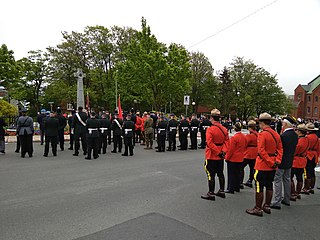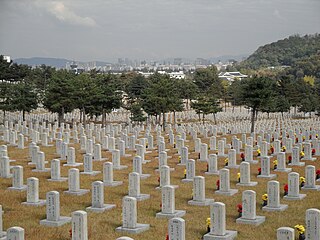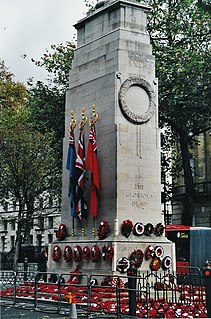 W
WAnzac Day is a national day of remembrance in Australia and New Zealand that broadly commemorates all Australians and New Zealanders "who served and died in all wars, conflicts, and peacekeeping operations" and "the contribution and suffering of all those who have served". Observed on 25 April each year, Anzac Day was originally devised to honour the members of the Australian and New Zealand Army Corps (ANZAC) who served in the Gallipoli Campaign, their first engagement in the First World War (1914–1918).
 W
WAnzac Day is a day of remembrance in Queensland, Australia. It is a public holiday held on 25 April each year. The date is significant as the Australian and New Zealand troops first landed at Gallipoli in World War I on 25 April 1915.
 W
WThe ANZAC Field of Remembrance is an annual event held at St. Andrew's Cathedral, Sydney, which is hosted by the War Widows' Guild of Australia NSW Ltd. The event involves the planting of wooden crosses in remembrance of those who have died due to their involvement in war.
 W
WArmistice Day is commemorated every year on 11 November to mark the armistice signed between the Allies of World War I and Germany at Compiègne, France at 5:45 am, for the cessation of hostilities on the Western Front of World War I, which took effect at eleven in the morning—the "eleventh hour of the eleventh day of the eleventh month" of 1918. But, according to Thomas R. Gowenlock, an intelligence officer with the U.S. First Division, shelling from both sides continued for the rest of the day, ending only at nightfall. The armistice initially expired after a period of 36 days and had to be extended several times. A formal peace agreement was only reached when the Treaty of Versailles was signed the following year.
 W
WCommemoration Day of Fallen Soldiers is the commemoration day observed in Finland on the third Sunday of May for the soldiers killed in the Winter War and Finnish Civil War 1918. After 1940 it was also the day of commemoration of the soldiers killed in the Continuation War and the Lapland War. There were also members of Lotta Svärd, who also were victims of war serving in uniforms on the front. Nowadays the day also commemorates Finnish soldiers killed in United Nations peacekeeping missions.
 W
WMemorial Day is a federal holiday in the United States for honoring and mourning the military personnel who have died in the performance of their military duties while serving in the United States Armed Forces. The holiday is observed on the last Monday of May. The holiday was formerly observed on May 30 from 1868 to 1970.
 W
WMemorial Day has been observed annually since 1 July 1917, to recall the losses of approximately 700 soldiers of the 1st Newfoundland Regiment from the Dominion of Newfoundland at Beaumont-Hamel on the first day on the Somme during the First World War. Since the induction of Newfoundland into Canada in 1949, "Memorial Day" has been amalgamated to commemorate the sacrifices of members of the armed forces of the Canadian province Newfoundland and Labrador in times of war. It is observed concurrently with Canada's national holiday, Canada Day.
 W
WMemorial Day in South Korea commemorates all the Korean men and women who have died during military service. In particular, the Battle of Bongoh Town, Battle of Cheongsan-ri, Korean War and the Vietnam War are remembered on this day. It is commemorated on June 6.
 W
WNational Aboriginal Veterans Day is a memorial day observed in Canada in recognition of aboriginal contributions to military service, particularly in the First and Second World Wars and the Korean War. It occurs annually on 8 November.
 W
WNational Pearl Harbor Remembrance Day, also referred to as Pearl Harbor Remembrance Day or Pearl Harbor Day, is observed annually in the United States on December 7, to remember and honor the 2,403 Americans who were killed in the Japanese surprise attack on Pearl Harbor in Hawaii on December 7, 1941, which led to the United States declaring war on Japan the next day and thus entering World War II.
 W
WThe National Service of Remembrance is held annually on Remembrance Sunday at the Cenotaph on Whitehall, London. It commemorates "the contribution of British and Commonwealth military and civilian servicemen and women in the two World Wars and later conflicts". The service has its origins in the 1920s and has changed little in format since.
 W
WRemembrance Day is a memorial day observed in Commonwealth member states. Remembrance Day has been observed since the end of the First World War to remember armed forces members who have died in the line of duty. Following a tradition inaugurated by King George V in 1919, the day is also marked by war remembrances in many non-Commonwealth countries. In most countries, Remembrance Day is observed on 11 November to recall the end of First World War hostilities. Hostilities formally ended "at the 11th hour of the 11th day of the 11th month", in accordance with the armistice signed by representatives of Germany and the Entente between 5:12 and 5:20 that morning. The First World War officially ended with the signing of the Treaty of Versailles on 28 June 1919.
 W
WRemembrance of the Dead is held annually on May 4 in the Netherlands. It commemorates all civilians and members of the armed forces of the Kingdom of the Netherlands who have died in wars or peacekeeping missions since the beginning of the Second World War.
 W
WRemembrance Sunday is held in the United Kingdom as a day to commemorate the contribution of British and Commonwealth military and civilian servicemen and women in the two World Wars and later conflicts. It is held at 11am on the second Sunday in November. Remembrance Sunday, within the Church of England, falls in the liturgical period of Allsaintstide.
 W
WThe Time of Remembrance and Reconciliation for Those Who Lost Their Lives during the Second World War is an annual international day of remembrance designated by Resolution 59/26 of the United Nations General Assembly on November 22, 2004. The resolution urges 'Member States, organizations of the United Nations system, non-governmental organizations and individuals' to pay tribute to the victims of World War II.
 W
WYom Hazikaron laShoah ve-laG'vurah, known colloquially in Israel and abroad as Yom HaShoah and in English as Holocaust Remembrance Day, or Holocaust Day, is observed as Israel's day of commemoration for the approximately six million Jews who perished in the Holocaust as a result of the actions carried out by Nazi Germany and its collaborators, and for the Jewish resistance in that period. In Israel, it is a national memorial day. The first official commemorations took place in 1951, and the observance of the day was anchored in a law passed by the Knesset in 1959. It is held on the 27th of Nisan, unless the 27th would be adjacent to the Jewish Sabbath, in which case the date is shifted by a day.